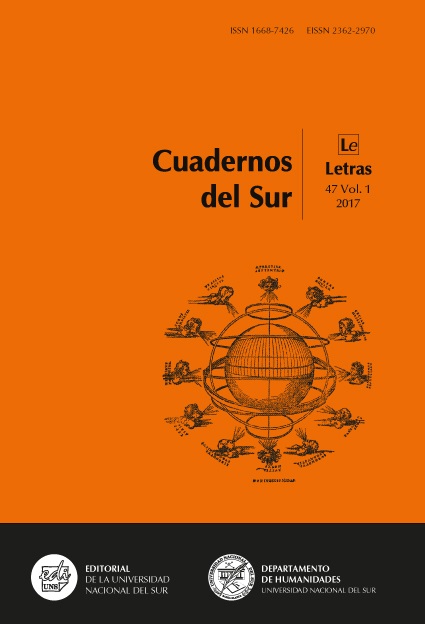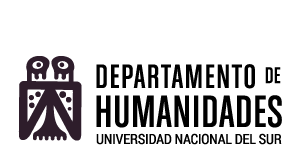Las Intercenales de Leon Battista Alberti y la crítica al saber humanista
Keywords:
Intercenales, Alberti, HumanismAbstract
According to Bacchelliand D’Ascia (2003), as from the title selected, the Intercenales byLeon Battista Alberti (2003) evidences “the intimate link between culture andsodalitas (brotherhood), a refi ned conversation circle where human stultitia (stupidity) provides sources of laughter, as opposed to the public and oratorical dimension common to the Ciceronian tradition” (2003: XXVIII). Having considered the wide and versatile Albertanian work, in this paper we will analyze the dialogues “The Writer” (“Scriptor”), “The Oracle” (“Oraculum”), “The Misfortune” (“Erumna”), and “The Deceased” (“Defunctus”), which are included in the Intercenales. The latter unveils the concept of an unfortunate intellectual who builds up individually and socially ineffi cient knowledge. Thus, ifthe underlying model in the thought of humanists such as L. Bruniis that of Cicero ́s and his ideal union of an intellectual and a man devoted to the vicissitudes of the republic, a solitary intellectual who is the victim of his own social and familiar surroundings is displayed in the Intercenales.
Downloads
References
Alberti, Leon Battista (1960), I libri della famiglia, Opere volgari. Vol. 1, Bari, Laterza, [edición de Cecil Grayson].
----- (1966), L’architettura (De re aedifi catoria), Milano, Il Polifi lo, [edición de Giovanni Orlandi].
----- (1976), De commodislitterarum atque incommodis, Firenze, Olschki, [edición de Laura Carotti].
----- (1991), De las ventajas y desventajas de las letras, Barcelona, PPU, [traducción de Alejandro Coroleu].
----- (2003),Intercenales, Bologna, Pendragon, [edición de Franco Bacchelli y Luca D’ Ascia].
----- (2003), Momus, London, The I Tatti Renaissance Library, [edición de Virginia Brown y Sarah Knight].
Aristóteles (1999), Retórica, Madrid, Centro de Estudios Políticos y Constitucionales, [edición de Antonio Tovar].
Hipócrates (1861), Oeuvres complètes d’ Hippocrate, IX, L’ Acadèmie Impériale de Médecine, [traducción de Émile Littré].
Baron, Hans (1966), The crisis of the early italian renaissance, México, Princeton University press.
----- (1993), En busca del humanismo cívico fl orentino, México, Fondo de Cultura Económica.
Bacchelli, Franco y D’Ascia, Luca (2003), “‘Delusione’ e ‘invenzione’ nelle ‘Inter-cenali’ di Leon Battista Alberti”, en Alberti, Leon Battista, Intercenales, Bologna, Pendragon, pp. 23-99.
Boschetto, Luca (2000), Leon Battista Alberti e Firenze. Bibliografi a, storia, letteratura, Firenze, Olschki.
Cardini, Roberto (2008), “Alberti scrittore e umanista”, en La vita e il mondo di Leon Battista Alberti I,Centrostudi L. B. Alberti, Città di Castello, pp. 23-40.
Catanorchi, Olivia (2005), “Tra politica e passione. Simulazione e dissimulazione in Leon Battista Alberti”, Rinascimento, vol. 45, pp. 137-177.
Fubini, Riccardo (1992), “Renaissance Historian: The Career of Hans Baron”, The Journal of Modern History, vol. 3, pp. 541-574.
Garin, Eugenio (1964), “Veinticinque intercenali sconosciute e inedite di L. B. Alberti”, Belfagor, vol.19, pp. 377-393.
----- (1973), “La letteratura degli umanisti”, en Cecchi, Emilio y Sapegno, Natalino (eds.), Storia della Letteratura Italiana. Volume terzo: Il Quattrocento e l’Ariosto, Milano, Garzanti, pp. 257-279.
----- (1992), Rinascite e rivoluzioni. Movimenti culturali dal XIV al XVIII secolo, Roma-Bari, Laterza.
How to Cite
Issue
Section
License
Copyright (c) 2019 Cuadernos Sur

This work is licensed under a Creative Commons Attribution-NonCommercial-ShareAlike 4.0 International License.
Aquellos autores/as que tengan publicaciones con esta revista, aceptan los términos siguientes:
- Los autores/as conservarán sus derechos de autor y garantizarán a la revista el derecho de primera publicación de su obra, el cuál estará simultáneamente sujeto a la licencia Atribución-No Comercial-CompartirIgual 4.0 Internacional CC BY-NC-SA 4.0.
- Los autores/as podrán adoptar otros acuerdos de licencia no exclusiva de distribución de la versión de la obra publicada (p. ej.: depositarla en un archivo telemático institucional o publicarla en un volumen monográfico) siempre que se indique la publicación inicial en esta revista.
- Se permite y recomienda a los autores/as difundir su obra a través de Internet (p. ej.: en archivos telemáticos institucionales o en su página web) una vez publicado su trabajo, lo cual puede producir intercambios interesantes y aumentar las citas de la obra publicada. (Véase El efecto del acceso abierto).










